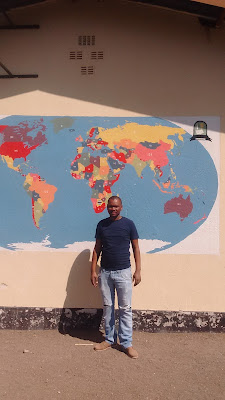I worry sometimes that there won’t be enough time and
sometimes I doubt whether I’m making the right decision by leaving at the end
of my service. Should I have applied to extend for another year? I strongly
considered it. I feel responsible for this project and my greatest fear is that
the project won’t be sustainable and that people will consider it a waste of
resources. But I also feel that there is only so much I would be able to do in
another year. There is a strong group of volunteers working on this project,
and we are fortunate enough to have a village institution (the Village
Development Committee) that has been supporting this project from the
beginning. I really believe that working on the reading room will be a great
opportunity for the Peace Corps volunteer who replaces me in October and that
there’s nothing I can bring to the table that the next volunteer wouldn’t be
able to. Still… sometimes I can’t help but feel uneasy about my choices.
Right now, this unease is tied to my current greatest hurdle
(it feels like there’s always something): internet. Once the electricity is
connected and the computers and printers are installed, our dream is to have
internet available on the three computers. We want to charge people a small fee
for using the internet and use that money to pay for the room’s upkeep
(electricity, paper, ink cartridges, etc). Not only would internet add to the
room’s sustainability, it would be such a game changer for people in my
village. Right now, the people who are lucky enough to have nice enough phones
that have some access to internet essentially only have access to facebook and
whatsapp. Both of those applications are incredibly popular and add many
opportunities for people to explore their interests and keep in touch with
people from all over. However, having complete access to the internet could add
so much more. Just being able to google things and ask questions. To do
research for school projects. To look up job postings. To learn a new skill. I
get so excited whenever I picture it.
Still, internet is not cheap. We’ve been so focused on just
putting these two rooms together that we haven’t done enough to find a feasible
method of getting internet to the reading room. There is a wealthy businessman
from the next village over who does a lot of philanthropic work in the region.
He is a huge supporter of education and I have been telling about our project
every step of the way. I have told him about our dreams for internet and asked
him to consider supporting us. I am also thinking of writing requests for
support to the three major internet companies in Botswana. Maybe one of them
could sponsor us as part of their philanthropic work. The issue, once again, is
time. Everything takes so much longer than I hope it will and I am running out
of time. Any ideas or words of wisdom from people with experience with this
sort of thing would be very much appreciated. I tend to paint a fairly rosy picture of my experiences
during my service, mostly because I am an optimistic person in general and do
not find it constructive to focus too much on the negative aspects of life. But I
thought it was important to write a post about some of the doubts and struggles
I’ve experienced along the way.
Progress












